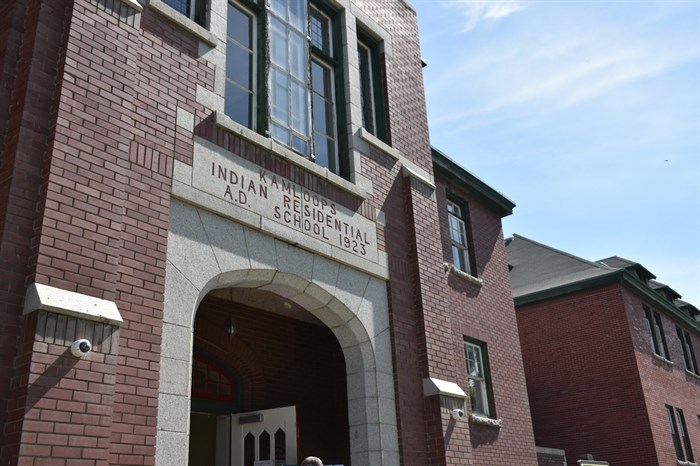
The former residential school stands as a reminder of Canada's recent history but is also repurposed for office space.
(LEVI LANDRY / iNFOnews.ca)
June 06, 2021 - 6:00 PM
As much of non-Indigenous Canada revisits the country’s colonial history others closer to it have questioned why so much of it has been preserved, including buildings like the former Kamloops Residential School.
Kukpi7 (Chief) Rosanne Casimir addressed that in a press conference Friday morning, where she explained that the old structure where so much harm was wrought was a decision made to be sure that the past is not forgotten.
“We know some have been torn down. For us, we want ours and will have it remain standing. It is a huge piece of history that we don't want to be forgotten, but to be learned from,” Casimir said.
The former residential school near where the remains of 215 children were found at an unmarked burial site is partially used as office space.
READ MORE: Foster care is modern-day residential school system: Inuk MP Mumilaaq Qaqqaq
According to Tk’emlups te Secwepemc security supervisor, Les Dean, the building housed offices for as many as 229 employees prior to COVID-19 health restrictions. They are used by various agencies, such as lawyer’s offices and First Nations Health Authority employees.
Repurposing of former residential and day schools is not uncommon, but the reasons may vary.
For the Tk’emlups community, the decision was in order to keep a reminder of “the history, the ugly truths and the positive future we have to create for future generations,” Casimir said.
The Chief of Okanagan Indian Band, Byron Louis, said he often wonders if that's the right decision. But his community isn’t keeping their former day schools by choice.
READ MORE: Petition calling for 'National Day of Mourning' for residential school victims grows
“We have three in total. One is used for the Band office, one for immersion school and the other is used for an elder’s centre,” Chief Byron Louis said. “Imagine always having to go into a place where there were so many bad memories. You don’t want to go in there.”
Day schools were also largely run by various churches and like the former Kamloops Residential School, the three Okanagan day schools were under Roman Catholic operation. The intention was to build day schools so children in the community wouldn’t have to be sent off to live at residential schools, known for their abusive practices.
“They thought they were being successful, but it turned out that these places were just as bad as any residential school, in terms of physical and mental abuse that went on there,” Louis said. “You won't find a lot of research on them, but they were just as brutal. Some of the stories I’ve been told would chill you to the bone.”
Although the literature is sparse on the history of “Indian day schools,” a class action lawsuit in 2019 compensated the former students for their abuses and traumas while attending.
Louis is frustrated with the bureaucracies and restrictions that entangle the Indian Act, which inhibits infrastructure funding needed to replace the Okanagan day schools.
READ MORE: A look at the residential-school system in Canada
But with the reopened wounds and trauma after the unmarked burial site on Tk’emlups land, there are talks of renewed efforts to replace the old schools, rather than repurpose them.
“I think that’s one of the discussions we’re having — finally trying to get rid of these old schools that have asbestos and other types of contaminants,” Louis said. “(The burial findings) triggered so many people again. They thought they’d dealt with it, but it's coming up again.”
While the financial restrictions of the Indian Act may bog down the process of gaining capital funding to replace the day schools, they are still being used for now. To Louis, if the buildings are to be kept, the best solution would be to use them for “healing centres.”
“It was a war against children and their only defense was to shut down their emotions. Otherwise they would not survive. People call them survivors — no, they are veterans,” Louis said.
To contact a reporter for this story, email Levi Landry or call 250-819-3723 or email the editor. You can also submit photos, videos or news tips to the newsroom and be entered to win a monthly prize draw.
We welcome your comments and opinions on our stories but play nice. We won't censor or delete comments unless they contain off-topic statements or links, unnecessary vulgarity, false facts, spam or obviously fake profiles. If you have any concerns about what you see in comments, email the editor in the link above.
News from © iNFOnews, 2021